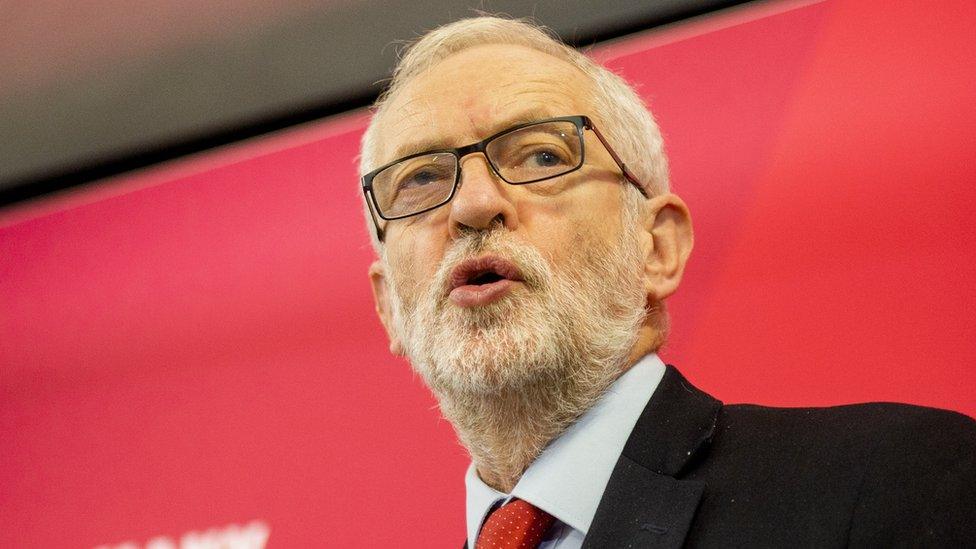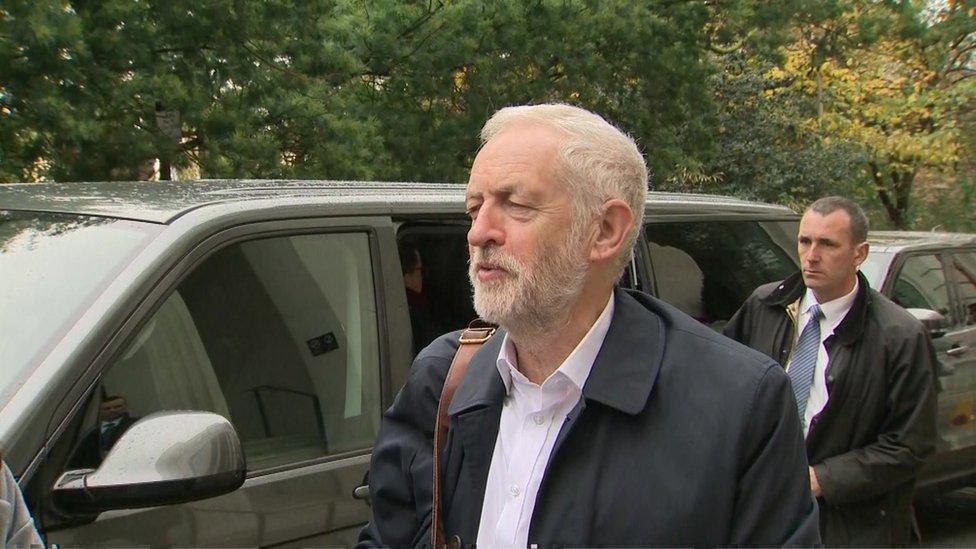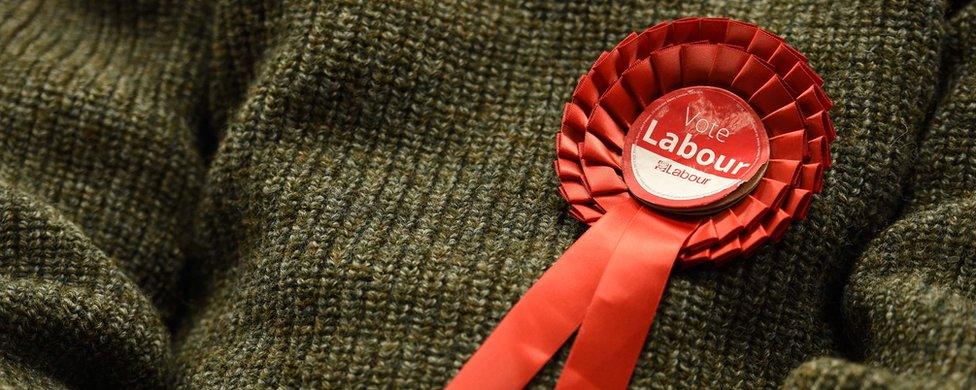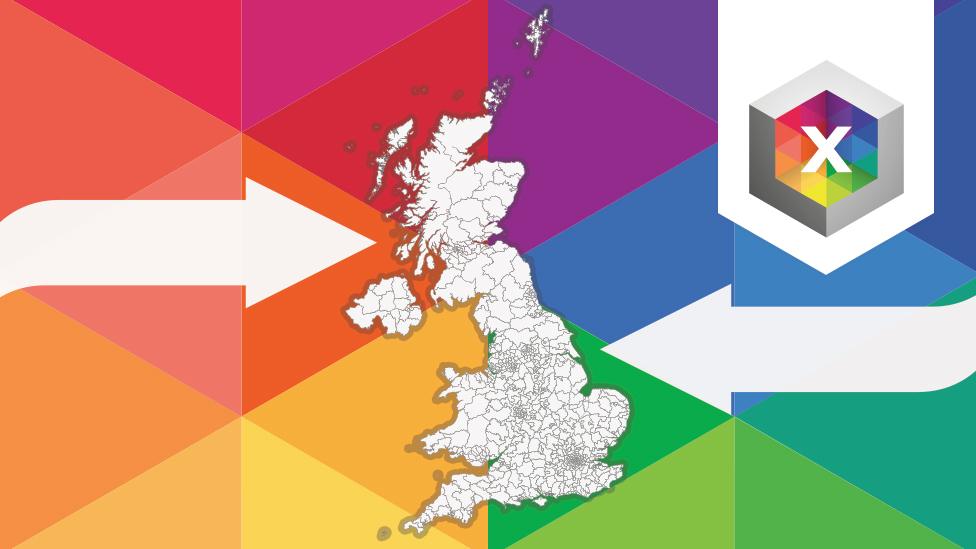General election 2019: Labour figures in manifesto agreement
- Published

Jeremy Corbyn has hailed Labour's "transformative" manifesto after finalising the document in a meeting with senior party figures.
The Labour leader said a "unanimous agreement" was reached by key union backers and his shadow cabinet after six hours of talks in London.
The details in the manifesto for the general election on 12 December are expected to be released on Thursday.
It is billed as "more radical" than the document campaigned on in 2017.
The party has already announced a number of policies, including a part-nationalisation of BT and extra spending on infrastructure.
But members had to decide in the talks on Saturday whether to include some policies from its party conference, including on free movement of people from the EU to the UK.
Mr Corbyn said he was "very, very proud" of the contents of the manifesto that gives the "promise of a better Britain".
Speaking on the steps of the Institute of Engineering and Technology after the meeting, he said: "That manifesto is a transformative document that will change the lives of the people of this country for the better.
"It will be a once in a generation opportunity to vote for a more egalitarian society that cares for all."
The BBC's Iain Watson said the party is expected to pledge additional support for women affected when the government in 2011 sped up plans to raise the age at which women could claim the state pension from 60 to 66.
Ahead of the talks, party figures were expected to debate whether to include a commitment to "maintain and extend" free movement rights for migrants, as demanded by delegates at September's party conference.
The party's 2017 manifesto stated that free movement - giving EU citizens the right to work and seek employment in the UK and UK citizens the same right in other EU countries - would end with Brexit.
A small number of protesters gathered outside the meeting, chanting in support of free movement.
The Liberal Democrats earlier called on Labour to make a "cast-iron commitment" to preserve free movement rights in its manifesto.

LIVE : Latest election updates
CONFUSED?: Our simple election guide, external
POLICY GUIDE: Who should I vote for?, external
REGISTER: What you need to do to vote

The party's home affairs spokeswoman Christine Jardine said failing to do so would be a "betrayal of future generations".
The Lib Dems are pledging a "fair, effective" immigration system if it is elected - with plans to resettle 10,000 unaccompanied refugee children a year.
'Protect all workers'
However, some within Labour are concerned that a more open policy on immigration could alienate voters in Leave-voting areas.
Len McCluskey - the leader of the Unite, the biggest Labour-supporting union - has called for new employment policies to address concerns about freedom of movement.

As he headed into the manifesto meeting, Mr Corbyn said it would be "transformative"
On Thursday, he denied a newspaper report that he had told Labour leader Jeremy Corbyn to take a tough line on free movement of workers.
But he said Labour would "protect all workers" through labour market regulations.
"It won't stop the free movement of labour. It will effectively make certain that greedy bosses, agency companies, are not abusing working people," he said.


There was a disagreement during the talks over whether to incorporate the conference policy of extending freedom of movement for workers in the manifesto.
Freedom of movement will continue if voters back Remain in the new referendum which Labour is pledging.
If voters back Leave, Labour would introduce its own immigration policy but, as the party wants a close relationship with the single market, it recognises there would be high levels of labour mobility.
But this would be underpinned by stricter regulation of the employment market to prevent migrant workers "undercutting" employees here and to stop migrants being exploited.
Some policies were agreed and not yet announced, for example, a process for compensating women adversely affected by a more rapid rise in the state pension age than they anticipated.
Prescriptions and dental checks will also be free in England too.

On Friday, Mr Corbyn confirmed an existing pledge to abolish university tuition fees will be included in the party's manifesto for the 12 December poll.
He also said bringing Royal Mail, rail and water utilities under public ownership "are clearly going to be in our manifesto next week".
Other parties have also begun announcing policies ahead of the official launch of their manifestos later in the campaign.
On Saturday, both the Lib Dems and the Conservatives made rival pledges on tree planting.
The Conservatives also announced £500m of funding over the next five years to help support developing countries in protecting oceans.
The Conservatives and Labour are set to field candidates in every constituency in Britain, except Speaker Sir Lindsay Hoyle's seat in Chorley in Lancashire.
The Brexit Party has put forward 275 candidates, having stood aside in all the seats won by the Tories in 2017.
Figures from PA suggest the party has also opted not to contest handfuls of other seats being defended by other parties, particularly in Scotland.


How did manifesto meeting work?
The so-called "Clause Five" party meeting offers an opportunity for senior figures to sign off on the party's manifesto.
It is attended by Labour's ruling National Executive Committee, including the shadow cabinet and trade union representatives.
Party staffers present a draft document, whose different policy areas are discussed in turn.
A vote is taken at the end of the meeting on the whole document, rather than voting section-by-section.
There are usually some small amendments. Party positions are unlikely to change - but will perhaps be clarified.

- Published11 December 2019

- Published13 November 2019
